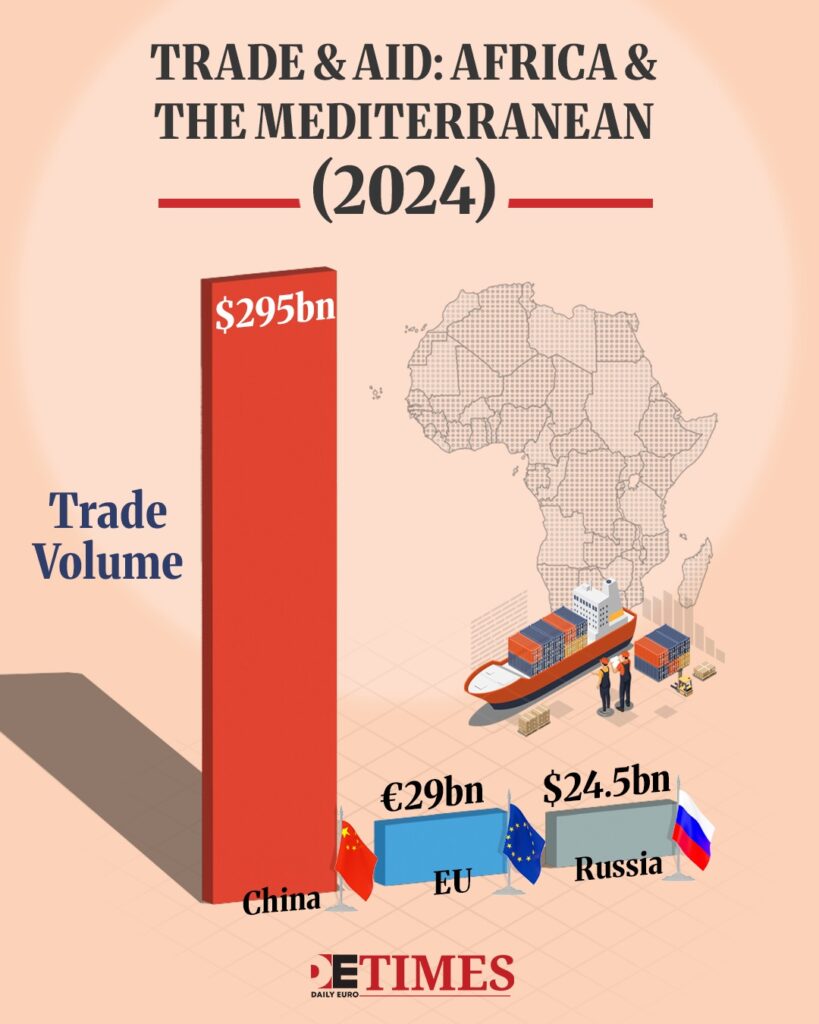The European Commission last week rolled out a new Pact for the Mediterranean. The pact covers trade, migration, and renewable energy projects but leaves out governance reforms, unlike the old Barcelona Process.
The End of Preaching
Thirty years ago, the Barcelona Declaration set up a partnership mixing values with business, focusing on human rights and economic cooperation. For a long time, Brussels linked aid to political reform and expected partners to make progress before handing over support.
Civil groups criticised Brussels for consulting too few people, pointing out victims of repression never got a voice.
Backing away from values risks losing what made Brussels stand out from other powers in the area.
Competitors Don’t Wait Around
China and Africa traded $295 billion in 2024, making Beijing the region’s biggest trading partner. Russia’s trade stood at $24.5 billion but Moscow offered security help with no political strings.
A number of African countries asked France to pull out troops and shut bases, showing a shift in loyalties. Many now prefer partners who don’t demand political changes.
Brussels allocated €29 billion for sub-Saharan Africa, yet local leaders reversed reforms in places like Mali after coups and kicked out European military forces.
Groups like Wagner jumped in quickly, proving fast, unconditional support beats slow money tied to reforms.
Brussels’ Credibility Issues
Brussels stayed quiet on Gaza but loudly backed Ukraine. Nearly 200 groups called for suspending the EU-Israel deal, pointing to double standards.
UN Special Rapporteur Francesca Albanese pressed Brussels to treat Israel like Russia when it comes to violations.
Mixed messages weaken Brussels when it talks to North African and Levant countries. Former EU foreign policy chief Josep Borrell admitted accusations of double standards followed him everywhere.
Trading Principles for Practical Wins
The new pact focuses on investment, energy, and migration control. It mentions education and culture but skips governance reform.
Commissioner Dubravka Šuica said Brussels talked to many groups, but the reality suggests otherwise.
A Carnegie report found the plan lacks real steps to fix social divides and urgent regional problems. Brussels chose to stay relevant rather than stick to principles, copying China’s and Russia’s quick, deal-focused style.

A Paradigm Shift?
The old European model tied aid to reforms to keep governments from misusing funds while oppressing people. Leaders paired support with help building institutions.
Focusing on trade and investment leaves out those pushing for political change and favors working directly with governments over civil society.
Business projects and cultural exchanges can’t replace lost power to push for change.
Brussels risks losing ground to powers that never claimed to care about values but made fast deals.
A Uneasy New Deal
High Representative Kaja Kallas said the EU promotes equal partnership. That sounds better than aid with strings but means accepting governments as they are.
Countries Brussels worked hard to reform now join regional projects without talks on political freedoms or civil society space. The focus lies on business and border control.
Protecting European commercial interests comes at the cost of giving up the power Brussels once had to push for change.
Lessons from Thirty Years
The Barcelona Process showed Brussels that pushing values can cost influence when others skip preaching. Attempts to reform politics in the Mediterranean had limited success while China built infrastructure and Russia sold arms.
Trade and investment matter more than political change, as the new pact shows. Europe protects its economic interests while others gain ground by offering fast deals without demands.
Success depends on what Mediterranean countries want – fast agreements or a unique European approach.
The pact will get approval at the November summit, marking 30 years since Barcelona – a moment to shift from exporting values to focusing on deals.
Keep up with Daily Euro Times for more updates!
Read also:
Old Rivalries as Leverage: Russia in the Eastern Mediterranean
Syria: Latest Visit Hints at Russia’s Return to Syria
A Temporary Fix: Meloni’s Eastern Mediterranean Strategy in Libya






